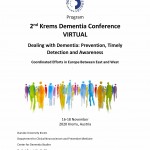Dealing with Dementia – 2nd Krems Dementia Conference
 Like all conferences since March this year this conference went virtual. Very pity as many attendees were looking forward to visiting the beautiful old city of Krems in Austria, just an hour west of Vienna at the river Danube. The University of Krems has the only academic dementia centre in Austria and started last year with a conference that focuses on Central and Eastern Europe. That was successful and a second edition was planned for 2020. This year’s theme was Dealing with Dementia: Prevention, Timely Detection and Awareness. Coordinated efforts in Europe Between East and West. Quite ambitious, but nothing wrong with that. In all these countries there is still a lack of awareness of dementia, but there are also dedicated people who want to drive the cause forward and they can inspire each other, which they did.
Like all conferences since March this year this conference went virtual. Very pity as many attendees were looking forward to visiting the beautiful old city of Krems in Austria, just an hour west of Vienna at the river Danube. The University of Krems has the only academic dementia centre in Austria and started last year with a conference that focuses on Central and Eastern Europe. That was successful and a second edition was planned for 2020. This year’s theme was Dealing with Dementia: Prevention, Timely Detection and Awareness. Coordinated efforts in Europe Between East and West. Quite ambitious, but nothing wrong with that. In all these countries there is still a lack of awareness of dementia, but there are also dedicated people who want to drive the cause forward and they can inspire each other, which they did.
A virtual conference is not as exciting as a physical one, but it has a few advantages too. We asked all speakers to pre-record their presentations and this resulted in everyone very well keeping their time. The chat function in Zoom also showed a lower threshold to post questions and comments than when being in a room and you have to go to the microphone. And where we had just over 100 registrations last year it went up to 300 now with participants from more than 15 countries, not only from Central and Eastern Europe but USA, Canada, Kazachstan and HongKong as well.
There were quite a number of Interdem members involved with Myrra Vernooy-Dassen, Iva Holmerova and Debby Gerritsen as keynote speakers and Stefanie Auer and me as co-chairs of the conference. Myrra Vernooy gave a well-received presentation on social health and prevention with the positive message that social engagement is probably the most important protective factor for getting dementia. After this Mary Mittelman explained the benefits of the New York University Caregiver invention that she developed and improved over the years and that showed a real benefit to informal caregivers including the whole family of the person with dementia.
On the second day of the conference a large number of community projects from Austria and the neighbor countries were presented in two sessions, of which the dementia friendly police got the most attention. This is an online training for police officers in one region that was extremely well received by the profession and now gets rolled out throughout the whole country (and got into the toolbox of the World Health Organization!). Wiesje van der Flier from the Amsterdam Alzheimer Centre updated us on the ABIDE project that aims to translate knowledge from diagnostic tests into practice and give people insights into their prognosis. Michael Brainin who is the Head of the Department Clinical Neurosciences and Preventive Medicine at Krems University gave a passionate presentation on the prevention of stroke and dementia, based on a Proclamation of the World Stroke Organization.
Another remarkably interesting presentation came from Debra Morgan about working with rural primary care memory clinics in Saskatchewan in Canada. And after that Sören Mattke from University of California Los Angeles touched on how prepared European Health Care Systems are in case we have a future Alzheimer’s treatment. Clearly, we don’t have systems in place yet with enough capacity to test and treat people when a disease modifying treatment becomes available for Alzheimer’s disease. Covid-19 has shown how important it is to better prepare.
A parallel symposium on this day discussed the use of Artificial Intelligence for dementia prevention, intervention, and care.
On the final day of the conference we had a great session on the learnings from Covid-19 with research from Debby Gerritsen on nursing homes in the Netherlands, Ninoslav Mimica with experience from Croatia, Alice Edtmayer from Austria and finally Iva Holmerova, Chair of Alzheimer Europe, with insights from Czech Republic in which she made clear how much the role of delirium with Covid-19 is underestimated. We moved on with an update on national dementia plans from Austria and Germany and the efforts taken in Bosnia Hercegovina to get to a plan as well. The final sessions touched in parallel on awareness projects as well as advocacy to enhance dementia policies.
Information can be found on https://www.donau-uni.ac.at/dementia-conference
Marc Wortmann; Consultant in strategy, governance, fundraising and events for non-profit organizations; former Executive Director of Alzheimer’s Disease International
Stefanie Auer; Danube- University –Krems, Centre for Dementia Studies/ Scientific Director MAS Alzheimerhilfe
